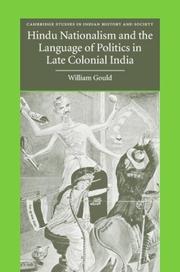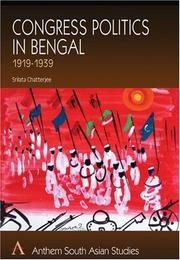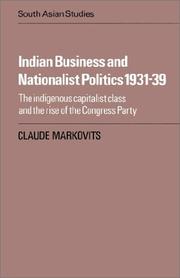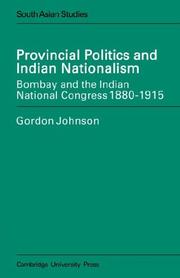| Listing 1 - 10 of 10 |
Sort by
|
Book
ISBN: 935150476X 9351502007 9789351502005 1322880247 9781322880242 9789351504764 9789351500636 9351500632 9353288770 Year: 2015 Publisher: Los Angeles
Abstract | Keywords | Export | Availability | Bookmark
 Loading...
Loading...Choose an application
- Reference Manager
- EndNote
- RefWorks (Direct export to RefWorks)
Evolution of Right to Property Law and its relationship with the idea of socialism!
Right of property --- Constitutional law --- Socialism --- Indian National Congress. --- Congresso Nacional Indiano --- Indiĭskiĭ nat︠s︡ionalʹnyĭ kongress --- All India Congress --- India Congress Party --- Congress Party --- INC --- Indischer Nationalkongress --- Inḍiyan Neshnal Kāngres --- Congresso nazionale indiano --- INK (Indiĭskiĭ nat︠s︡ionalʹnyĭ kongress) --- Kāṅgresa (Political party : India) --- Akhila Bhāratavarshīya Kāṅgresa

ISBN: 9780511497391 9780521830614 9780521172202 051119384X 9780511193842 0521830613 0511195915 9780511195914 0511194587 9780511194580 0511195257 9780511195259 0511497393 9786610477838 6610477833 1107148219 9781107148215 1280477830 9781280477836 0511314264 9780511314261 0521172209 Year: 2004 Publisher: Cambridge, UK New York Cambridge
Abstract | Keywords | Export | Availability | Bookmark
 Loading...
Loading...Choose an application
- Reference Manager
- EndNote
- RefWorks (Direct export to RefWorks)
In this book William Gould explores what is arguably one of the most important and controversial themes in twentieth-century Indian history and politics: the nature of Hindu nationalism as an ideology and political language. Rather than concentrating on the main institutions of the Hindu Right in India as other studies have done, the author uses a variety of historical sources to analyse how Hindu nationalism affected the supposedly secularist Congress in the key state of Uttar Pradesh. In this way, the author offers an alternative assessment of how these languages and ideologies transformed the relationship between Congress and north Indian Muslims. The book makes a major contribution to historical analyses of the critical last two decades before Partition and Independence in 1947, which will be of value to scholars interested in historical and contemporary Hindu nationalism, and to students researching the final stages of colonial power in India.
Secularism --- Nationalism --- Religion and politics --- Indian National Congress. --- Congresso Nacional Indiano --- Indiĭskiĭ nat︠s︡ionalʹnyĭ kongress --- All India Congress --- India Congress Party --- Congress Party --- INC --- Indischer Nationalkongress --- Inḍiyan Neshnal Kāngres --- Congresso nazionale indiano --- INK (Indiĭskiĭ nat︠s︡ionalʹnyĭ kongress) --- Kāṅgresa (Political party : India) --- Akhila Bhāratavarshīya Kāṅgresa --- Arts and Humanities --- History
Book
ISBN: 9781400875764 1400875765 9780691030135 9780691622484 069164926X Year: 2015 Publisher: Princeton, NJ
Abstract | Keywords | Export | Availability | Bookmark
 Loading...
Loading...Choose an application
- Reference Manager
- EndNote
- RefWorks (Direct export to RefWorks)
By tracing the path of the Congress Party's development since independence, the author demonstrates the reasons for its success. A postscript deals with the 1967 elections, regarded as a turning point in post-independence Indian politics.Originally published in 1968.The Princeton Legacy Library uses the latest print-on-demand technology to again make available previously out-of-print books from the distinguished backlist of Princeton University Press. These editions preserve the original texts of these important books while presenting them in durable paperback and hardcover editions. The goal of the Princeton Legacy Library is to vastly increase access to the rich scholarly heritage found in the thousands of books published by Princeton University Press since its founding in 1905.
POLITICAL SCIENCE / General. --- Indian National Congress. --- Congresso Nacional Indiano --- Indiĭskiĭ nat︠s︡ionalʹnyĭ kongress --- All India Congress --- India Congress Party --- Congress Party --- INC --- Indischer Nationalkongress --- Inḍiyan Neshnal Kāngres --- Congresso nazionale indiano --- INK (Indiĭskiĭ nat︠s︡ionalʹnyĭ kongress) --- Kāṅgresa (Political party : India) --- Akhila Bhāratavarshīya Kāṅgresa --- India --- Politics and government
Book
ISBN: 9780199082216 Year: 2013 Publisher: New Delhi : Oxford University Press,
Abstract | Keywords | Export | Availability | Bookmark
 Loading...
Loading...Choose an application
- Reference Manager
- EndNote
- RefWorks (Direct export to RefWorks)
This text provides a thematic account of political processes and discursive policy practices and shifts which shaped the thinking and approach of the Indian National Congress. It assesses the impact of transformation in economy, society, and polity on the Congress. The volume interprets the politics of change in India and how this developed Congress policies, especially under the United Progressive Alliance.
Government - Non-U.S. --- Regions & Countries - Asia & the Middle East --- History & Archaeology --- Law, Politics & Government --- Government - Asia --- South Asia --- Indian National Congress. --- India --- Politics and government --- Congresso Nacional Indiano --- Indiĭskiĭ nat︠s︡ionalʹnyĭ kongress --- All India Congress --- India Congress Party --- Congress Party --- INC --- Indischer Nationalkongress --- Inḍiyan Neshnal Kāngres --- Congresso nazionale indiano --- INK (Indiĭskiĭ nat︠s︡ionalʹnyĭ kongress) --- Kāṅgresa (Political party : India) --- Akhila Bhāratavarshīya Kāṅgresa

ISBN: 1283377543 9786613377548 1843313669 1843310635 Year: 2002 Publisher: London : Anthem Press,
Abstract | Keywords | Export | Availability | Bookmark
 Loading...
Loading...Choose an application
- Reference Manager
- EndNote
- RefWorks (Direct export to RefWorks)
In examining the nature of the interaction between institutional politics as represented by the Congress and popular politics in Bengal between 1919 and 1939, this book is a significant and original contribution to current research in the field.
Indian National Congress. --- Congresso Nacional Indiano --- Indiĭskiĭ nat︠s︡ionalʹnyĭ kongress --- All India Congress --- India Congress Party --- Congress Party --- INC --- Indischer Nationalkongress --- Inḍiyan Neshnal Kāngres --- Congresso nazionale indiano --- INK (Indiĭskiĭ nat︠s︡ionalʹnyĭ kongress) --- Kāṅgresa (Political party : India) --- Akhila Bhāratavarshīya Kāṅgresa --- Bengal (India) --- Bengal --- Fort William (India) --- Presidency of Fort William (India) --- Bengale (India) --- Baṅgāla (India) --- Eastern Bengal and Assam (India) --- West Bengal (India) --- East Bengal (Pakistan) --- Politics and government. --- History

ISBN: 0521016827 0511563337 0521265517 052105110X Year: 1985 Volume: 33. Publisher: Cambridge : Cambridge University Press,
Abstract | Keywords | Export | Availability | Bookmark
 Loading...
Loading...Choose an application
- Reference Manager
- EndNote
- RefWorks (Direct export to RefWorks)
The 1930s was a critical decade in Indian politics. It saw the Congress Party begin its rise to political dominance, while Indian 'big business' strengthened its position in the economy. This book seeks to analyse the response of India's most important indigenous businessmen to the growth of political nationalism. Dr Markovits' study falls into three parts: an analysis of the structure of the business class, revealing its basic heterogeneity and lack of political unity; an examination of the impact of the Depression of the 1930s on the fortunes of Indian businessmen and on government economic policy; and a survey of the uneasy and changing relationship between businessmen and Congress at a time of political turmoil and realignment. Drawing heavily on the private papers of prominent businessmen as well as on a wealth of official sources, this is the first systematic study, on an all-India scale, of the political attitude of big business during the final and most crucial phase of the nationalist struggle. Given increasing prominence of businessmen in Indian politics after 1920 an understanding of their behaviour is fundamental to our view of the overall pattern of Indian nationalist politics. All those interested in the rise of anti-colonial movements and in patterns of capitalist development in Third World countries should also find matter for thought in this sensitive and unusual study.
Business and politics --- Business --- Politics and business --- Politics, Practical --- Political business cycles --- History --- Political aspects --- Indian National Congress --- Congresso Nacional Indiano --- Indiĭskiĭ nat︠s︡ionalʹnyĭ kongress --- All India Congress --- India Congress Party --- Congress Party --- INC --- Indischer Nationalkongress --- Inḍiyan Neshnal Kāngres --- Congresso nazionale indiano --- INK (Indiĭskiĭ nat︠s︡ionalʹnyĭ kongress) --- Kāṅgresa (Political party : India) --- Akhila Bhāratavarshīya Kāṅgresa --- India --- Politics and government --- Arts and Humanities

ISBN: 0521202590 0521619653 0511563310 Year: 1973 Publisher: Cambridge : Cambridge University Press,
Abstract | Keywords | Export | Availability | Bookmark
 Loading...
Loading...Choose an application
- Reference Manager
- EndNote
- RefWorks (Direct export to RefWorks)
This is a study of the Indian National Congress, the first political association to approach the government of India at an all-India level. The Congress became the most important national party in twentieth century India, and the whole history of the freedom movement is closely bound up with its fortunes. National politics, however, were influenced by regional and local affairs. In the early twentieth century the Indian Congress was split between the 'Moderates' and the 'Extremists'. Dr Johnson argues that this division was closely related to existing rivalries between politicians in the provinces, and that provincial interests determined their national point of view. Because the early Congress depended so much for its regular organisation on men from Bombay, party lines in western India were particularly important in determining the course of the struggles between the parties in the National Congress. The unpublished letters and diaries of the protagonists in these disputes have enabled Dr Johnson to examine this theme in detail. This is the first book to stress the need for study of regional and local politics as an integral part of the history of the Congress. Its revelation of the complex connections between parochial, provincial and all India politics adds a new dimension to our understanding of nationalism in South Asia.
Arts and Humanities --- History --- Indian National Congress. --- Bombay (India : State) --- Politics and government. --- Congresso Nacional Indiano --- Indiĭskiĭ nat︠s︡ionalʹnyĭ kongress --- All India Congress --- India Congress Party --- Congress Party --- INC --- Indischer Nationalkongress --- Inḍiyan Neshnal Kāngres --- Congresso nazionale indiano --- INK (Indiĭskiĭ nat︠s︡ionalʹnyĭ kongress) --- Kāṅgresa (Political party : India) --- Akhila Bhāratavarshīya Kāṅgresa --- Bombay (Province) --- Maharashtra (India) --- Gujarat (India) --- Hyderabad (India : State) --- Saurashtra (India)
Book
ISBN: 0191954284 0192678183 Year: 2022 Publisher: Oxford : Oxford University Press,
Abstract | Keywords | Export | Availability | Bookmark
 Loading...
Loading...Choose an application
- Reference Manager
- EndNote
- RefWorks (Direct export to RefWorks)
This text examines the immense changes that have occurred in Indian politics over the past decade and its impact on the Indian National Congress. The impact is most apparent in the changing fortunes of the Congress party, which suffered two major defeats in 2014 and 2019 elections, bringing the party's crisis to the front and centre of public debate. This book seeks to understand the reasons for these enormous changes by looking first at the underlying conditions that led to the decline of the Congress and, second, the challenges' both external and internal' confronting the Congress and, while doing so, estimating its impact on Indian politics and on the Congress.
Politics and Government. --- Politics & government. --- Indian National Congress. --- India --- Politics and government --- Congresso Nacional Indiano --- Indiĭskiĭ nat︠s︡ionalʹnyĭ kongress --- All India Congress --- India Congress Party --- Congress Party --- INC --- Indischer Nationalkongress --- Inḍiyan Neshnal Kāngres --- Congresso nazionale indiano --- INK (Indiĭskiĭ nat︠s︡ionalʹnyĭ kongress) --- Kāṅgresa (Political party : India) --- Akhila Bhāratavarshīya Kāṅgresa --- Politics and government. --- Since 2014
Book
ISBN: 9351505774 9351505790 9789351505792 9789351505785 9351505782 9353288509 Year: 2016 Publisher: New Delhi, India
Abstract | Keywords | Export | Availability | Bookmark
 Loading...
Loading...Choose an application
- Reference Manager
- EndNote
- RefWorks (Direct export to RefWorks)
"India, June 1975. Fundamental rights are suspended. The Opposition is in jail. The Press is shut down. And Prime Minister Indira Gandhi has just declared Emergency. Only one political party supports Indira Gandhi's action--the Communist Party of India (CPI). Why did the CPI take up this lonely and much-criticised stand? Were there any pressures from the Soviet Union or was the CPI looking for some political mileage? CPI's stance on the issue has never been discussed, analysed and understood. In an exhaustive study of the period, David Lockwood lays bare the facts before us. Through personal interviews with CPI members, internal documents of the party and archives, he presents the most thorough study of the CPI and the Emergency so far"--Provided by publisher.
Socialism --- Crisis management in government --- Government crisis management --- Public administration --- Marxism --- Social democracy --- Socialist movements --- Collectivism --- Anarchism --- Communism --- Critical theory --- History --- Gandhi, Indira, --- Communist Party of India --- Indian National Congress --- Congresso Nacional Indiano --- Indiĭskiĭ nat︠s︡ionalʹnyĭ kongress --- All India Congress --- India Congress Party --- Congress Party --- INC --- Indischer Nationalkongress --- Inḍiyan Neshnal Kāngres --- Congresso nazionale indiano --- INK (Indiĭskiĭ nat︠s︡ionalʹnyĭ kongress) --- Kāṅgresa (Political party : India) --- Akhila Bhāratavarshīya Kāṅgresa --- Communist Party of India (Marxist) --- Yin-tu kung chʻan tang --- Indian Communist Party --- Kommunisticheskai︠a︡ partii︠a︡ Indii --- Bhāratīya Kamyunisṭa Pārtī --- Kommunistische Partei Indiens --- Bhārata Kamiunist̲a Pārt̲ī --- CPI --- Hindūstānī Kamyūnisṭ Pārṭī --- Sāmyavādī Pārṭī --- Samyvadi Parti --- India --- Politics and government --- Economic policy
Book
ISBN: 9789351502661 935150266X 9789351502654 9351502651 9351505324 Year: 2015 Publisher: New Delhi, India
Abstract | Keywords | Export | Availability | Bookmark
 Loading...
Loading...Choose an application
- Reference Manager
- EndNote
- RefWorks (Direct export to RefWorks)
"Delineating the differing ideological positions held by Sardar Vallabhbhai Patel, C. Rajagopalachari and Dr. Rajendra Prasad on the one hand and of their Leftist/Socialist detractors and opponents on the other, this book questions the validity of blanket branding based on Eurocentric categories without regard to the Indian context. It establishes that these three Gandhian leaders did not represent conservative or reactionary forces. They, in fact, practiced and promoted progressive ideas in their vision of socio-economic reconstruction of the country. Being anti-imperialist to the core, they stood for democratic and secular ideals promoting communal harmony effectively. This study attempts to relook at the categorization of 'Right' and 'Left' in our national politics and establishes the fact that 'history is not to be studied through the prism of politics.' It is as much a book for the scholars and researchers as it is for anyone interested in Indian politics"--Provided by publisher.
Right and left (Political science) --- Democracy --- Self-government --- Political science --- Equality --- Representative government and representation --- Republics --- Left (Political science) --- Left and right (Political science) --- Right (Political science) --- History --- Patel, Vallabhbhai, --- Rajagopalachari, C. --- Prasad, Rajendra, --- Gandhi, --- Rājendra-prasāda, --- Rajendraprasad, --- Rajendra Babu, --- Rajēntirap Pirasātar, --- Pirasātar, Rājēntira, --- Piracāt, Rājēntira, --- Rājēntira Piracāt, --- Rajendra Prasad, --- Prasāda, Rājendra, --- Rājendraprasāda, --- Chakravarti Rajagopalachari, --- Rājagōpālācārya, Cakravartī, --- Rajagopalachariar, Chakravarti, --- Rajaji, --- Rajagopalachari, Chakravarti, --- Rājakōpālāccāriyār, Cakkaravartti, --- Irājāji, --- Rājakōpālāccāri, Cakkaravartti, --- Rājakōpālāccāri, Cakravartti, --- Rājagōpālācāri, Cakravarti, --- Rājagōpālācārya, Cakravarttī, --- Ācāriyā, Cakarvartī Rāju Gopālu, --- Cakarvartī Rāju Gopālu Ācāriyā, --- Gopāl, Cakarvartī Rāju, --- Aachria, Chakarwartee Raj Gopal, --- Gopal, Chakarwartee Raj, --- Ācāriyah, Rājgopālu, --- Patel, Vallabhbhai Jhaverbhai, --- Sirdar Vallabhai Patel, --- Vallabhbhai Jhaverbhai Patel, --- Patel, Sirdar Vallabhai, --- Patel, Sardar Vallabhbhai, --- Sardar Vallabhbhai Patel, --- Sardar Patel, --- Patel, --- Saradāra Vallabhabhāī Paṭela, --- Paṭela, Saradāra Vallabhabhāī, --- Sartār Paṭēl, --- Paṭēl, Sartār, --- Vallapay Paṭēl, --- Paṭēl, Vallapay, --- Aṇṇal Kānti, --- Gāndhi, Em. Ke., --- Gandhi, M. K. --- Gāndhī, Ma. Ka., --- Gāndhī, Mōhanadāsa Karamacanda, --- Gandhi, Mohandas, --- Gandhi, Mohandas K. --- Gandhi, Mohandas Karamchand, --- Gāndhījī, --- Gandi, --- Gandi, M. K. --- Gāndī, Mahātamā, --- Gandi, Mahattŭma, --- Gandi, Mokhandas Karamchand, --- Gandī, Muhandās Kāramchānd, --- Ganji, Mahatoma, --- Ghāndi, --- Ghāndī, Mūhāndās Karamshānd, --- Gkanti, --- Kan-ti, --- Kandi, --- Kānti, --- Kānti, Mōkan̲tās Karamcant, --- Kāntiyaṭikaḷ, --- Mahātmā Gāndhījī, --- Mahātmājī, --- Makātmā Kānti, --- Mōhanadāsa Karamacanda Gāndhī, --- Mōkan̲tās Karamcant Kānti, --- גאנדי, מ.ק --- גאנדי, --- גנדהי, --- مهاتما گاندهى --- گاندهى، مهاتما --- گاندى، مهاتما --- گاندى، مهنداس کارمچاند --- گاندھى، --- Political and social views. --- Influence. --- Indian National Congress --- Congresso Nacional Indiano --- Indiĭskiĭ nat︠s︡ionalʹnyĭ kongress --- All India Congress --- India Congress Party --- Congress Party --- INC --- Indischer Nationalkongress --- Inḍiyan Neshnal Kāngres --- Congresso nazionale indiano --- INK (Indiĭskiĭ nat︠s︡ionalʹnyĭ kongress) --- Kāṅgresa (Political party : India) --- Akhila Bhāratavarshīya Kāṅgresa --- History. --- India --- Politics and government
| Listing 1 - 10 of 10 |
Sort by
|

 Search
Search Feedback
Feedback About UniCat
About UniCat  Help
Help News
News